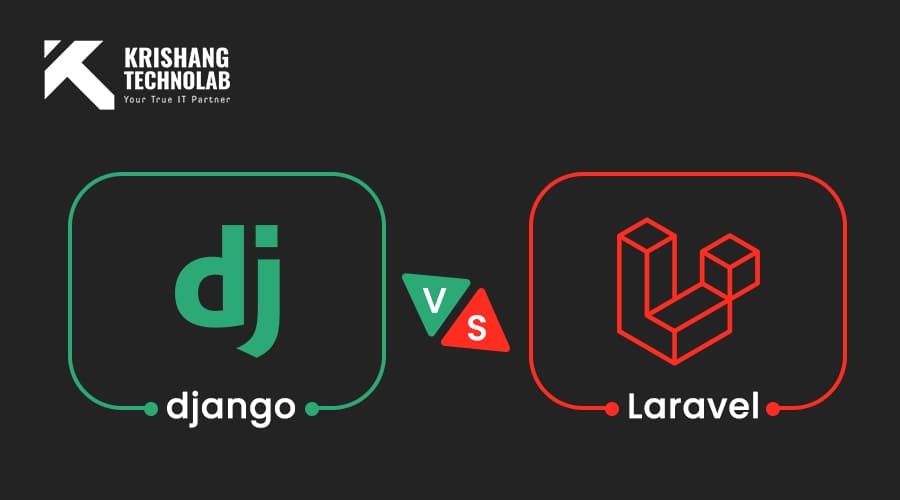
In today’s world of digitization, website development has become a boon for businesses. You rarely find a business without a website. It has benefited the company’s growth market presence and connecting it with its customers. When we discuss websites getting the most out of a website is essential.
There are many technologies and frameworks available for website development. This article provides insights into Django VS Laravel the superior choice for web development. Frameworks are essential in simplifying and accelerating the process of building web applications.
There are thousands of frameworks available among which Django and Laravel are popular picks for developers. Both frameworks offer powerful tools to create efficient web applications but when it comes to performance which framework is best? Let us discuss a comprehensive comparison of Laravel VS Django. We will explore their similarities and differences. It will ultimately determine which framework offers the best performance.
What are web frameworks?
It’s crucial to understand what web frameworks are before discussing how Django and Laravel differ. Web frameworks are software building blocks that help programmers create web applications.
They provide an array of predefined tools libraries, and functionalities that speed up the development process while enabling developers to concentrate on the critical components. Web frameworks expedite the development process by handling routine activities like routing, database interfaces, form management, and security.
Django VS Laravel: Overview
What is Django?
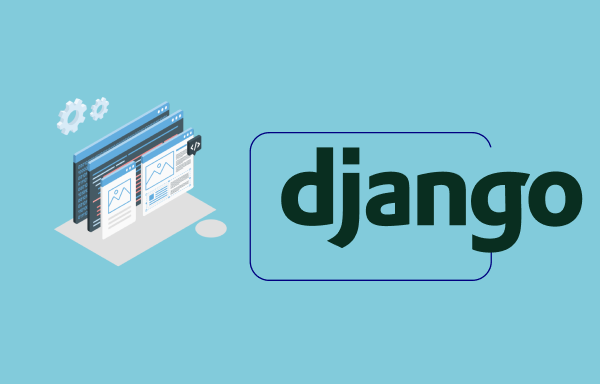
This Framework is a high level web framework using MVC architecture. It popularity is one of the top web development frameworks are due to its architecture and design concepts. This is enables developers to develop scalable and secure web applications.
It offers numerous capabilities, including the powerful Django ORM, that simplify database management and accelerate development. Moreover, Django includes integrated authorization and authentication techniques that make it simple for developers to safeguard their web applications.
Django CMS an extension of the Django framework, adds a robust content management system. Django CMS provides a user-friendly interface for managing website content allowing developers to create dynamic and customizable websites.
What is Laravel?
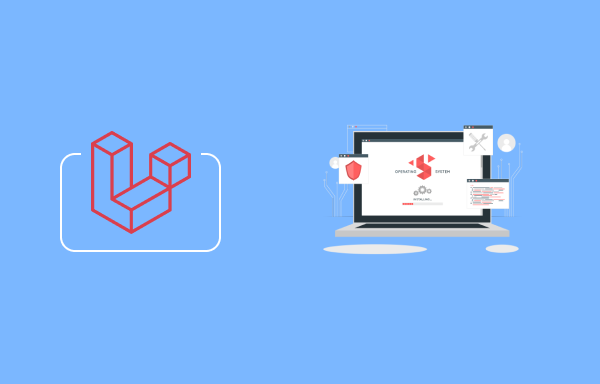
The PHP-based web framework Laravel also is renowned for its neat syntax and developer-friendly approach. Due to its simplicity and rich syntax, Laravel has grown considerably in popularity among Laravel developers.
Laravel uses MVC architecture which also prioritizes developer productivity. It has a wide range of capabilities, including the Eloquent ORM which makes interacting with databases simple and optimizes database maintenance. Hire Laravel Experts to leverage the framework’s rich ecosystem, extensive libraries, and community support to deliver projects with faster development cycles and cost-effectiveness.
Through its flourishing community, Laravel also offers an efficient routing system, an excellent template engine called Blade, and a variety of extensions and packages. There are numerous Laravel development companies and agencies. They offer Laravel development services for clients wishing to employ Laravel developers.
Django vs Laravel: A Comparison of Key Features
| Features | Django | Laravel |
| Programming Language | Python | PHP |
| Architecture | Model View Controller (MVC) | Model View Controller (MVC) |
| ORM | Django ORM | Eloquent ORM |
| Routing | URL Routing | Laravel Routing |
| Templating Engine | Built-in templating engine | Blade templating engine |
| Community | Large and active community | Rapidly growing community |
| Security | Built-in security features (CSRF, XSS, SQL injection, etc.) | Built-in security features (CSRF, input validation, etc.) |
| Performance | Emphasizes efficient query execution and caching | Leverages PHP features and caching mechanisms |
| Scalability | Supports horizontal scalability and load balancing | Supports horizontal scalability and load balancing |
Django VS Laravel: In-depth Comparison
Django VS Laravel: Which one is more popular

In terms of the preferences of the product owners, both frameworks show a significant rise, according to Google Trends.
According to Github Laravel has 74.2k Stars and 23.9k Forks, whereas Github Django has 72.2k Stars and 29.6k Forks.
Django Vs Laravel: Similarities
MVC Architecture
Both Laravel and Django follow the MVC architectural pattern, which helps to organize code and separate concerns. This pattern enhances code reusability, maintainability, and overall application structure.
Object-Relational Mapping (ORM)
Both Frameworks consist of powerful ORM layers. It allows developers to connect to the database using high-level object-oriented programming rather than writing raw SQL queries. Laravel uses Eloquent ORM, while Django uses Django ORM.
Routing
Both frameworks offer flexible and robust routing systems that allow developers to define routes and handle HTTP requests smoothly. Django uses URL routing, while Laravel uses its routing mechanism.
Templating Engines
Django and Laravel provide these tools, enabling programmers to divide the presentation layer from the application center. While Laravel utilizes the robust and user-friendly Blade template engine, Django uses its built-in templating engine.
Django and Laravel: What are the differences between the frameworks?
Language
The programming languages that Django and Laravel use are one of the main differences.
Python, a popular and flexible language recognized for its readability and effectiveness, forms the foundation of Django.
In contrast, Laravel is a PHP-based framework. PHP is a popular web development technology. The developer should select Python or PHP according to the project’s requirements.
Syntax and Learning Curve
Syntax and coding differ between Django and Laravel. The syntax of Django adheres to Python’s principles, which are known for their simplicity and clarity.
On the contrary, Laravel has a particular, refined, and expressive syntax. Django may be easier for developers with Python knowledge, while a PHP developer will admire Laravel.
Community and Ecosystem
Both Laravel and Django both have huge ecosystems and vibrant communities.
The Django programming language has been around for a long time. It has a significant developer community that offers support, documentation, and a range of third-party packages and libraries.
Despite being more recent, Laravel is rising substantially in popularity, and its developer community is growing. The Laravel ecosystem includes many tools and extensions to add features to Laravel projects.
Django VS Laravel: Which Framework Offers Better Performance?
Django and Laravel both provide efficient ways to construct highly efficient web apps. However, many components, including speed, efficiency, scalability, and security, may impact their performance. Let’s examine these factors in the context of Django and Laravel.
Django VS Laravel: Speed and Efficiency
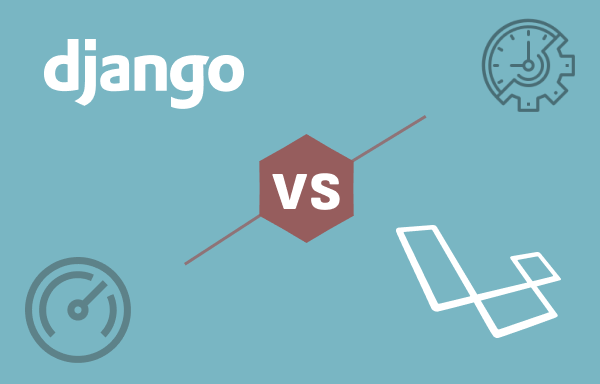
Being founded on Python, Django benefits from its speed and efficiency. Although Python’s interpreted structure may result in some expenses, Django’s built-in caching techniques and optimization strategies minimize this. Furthermore, Django’s emphasis on efficient query execution and database optimization adds to its overall speed and efficiency. The Django framework offers a solid platform for web applications, ensuring that they handle large loads and respond quickly to user requests.
On the other hand, Laravel is a framework of PHP, a scripting language recognized for its performance and quickness. To boost performance, Laravel uses PHP’s features and optimization options. It uses opcode caching. Additionally, Laravel has an easy yet effective routing technique that allows the framework to handle requests swiftly. Laravel provides quick application creation while maintaining high speed due to its expressive syntax and simplified development process.
Django VS Laravel: Scalability
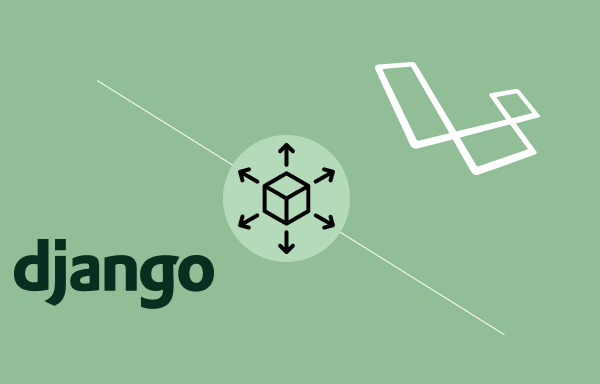
Django and Laravel offer good scalability options allowing applications to handle increasing user traffic and growing databases. Django’s ability to work seamlessly with databases and its robust caching mechanisms promotes scalability.
Django ORM provides a convenient way to interact with the database and its scalability features ensure efficient query execution and handling of large datasets. Additionally Django supports horizontal scalability through load balancing and distributed computing techniques.
Similarly, Laravel provides scalability features through its Eloquent ORM and database management tools. Laravel applications can handle large-scale databases and high-user traffic by optimizing database queries and leveraging caching mechanisms. Through load balancing and distributed computing methods, Laravel also enables horizontal scalability, allowing applications to scale as required.
Django VS Laravel: Security
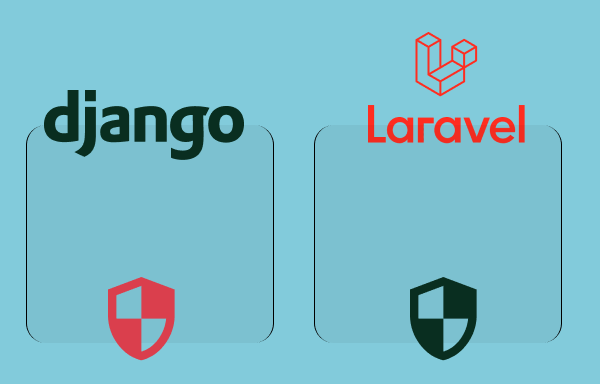
The most essential aspect of developing online applications is security. Both Django and Laravel have safety features to guard against potential risks. Django emphasizes security and has standard features like defense against SQL injection, Cross-Site Scripting, and Cross-Site Request Forgery (CSRF) attacks.
Laravel also prioritizes security and offers features such as CSRF protection, input validation, and secure authentication mechanisms out of the box. Laravel’s ORM protects against SQL injection attacks, and the framework encourages best practices for secure coding. Laravel’s security features and active community contribute to the framework’s overall security posture.
Django VS Laravel: Popularity
Both Django and Laravel frameworks have experienced significant rises in popularity among web developers. Django has established itself as an excellent platform for creating complex web applications. It is due to Django’s extensive history and maturity. The Django ecosystem is massive and vibrant.
Despite being a more recent framework, Laravel has experienced an immediate increase in popularity. Laravel developers get attracted by the framework’s appealing syntax, developer-friendly approach, and vast ecosystem. The Laravel community is dynamic and passionate, providing many tools, guides, and Laravel development firms for enterprises looking for Laravel development services.
Documentation
Both frameworks have well-documented frameworks. Laravel provides comprehensive documentation with clear examples, tutorials, and guides, making it beginner-friendly and easy to understand.
It also offers detailed documentation that covers installation, configuration, and advanced features. Both frameworks have active communities that provide support and contribute to improving documentation.
Microservices Compatibility
Both platforms are efficient for microservices. Laravel offers built-in support for creating microservices-based applications. Its lightweight and scalable architecture helps to achieve the goal. It provides features like service containers, service providers, and easy integration with external services.
Django is a full-featured framework used to build microservices, but it may require additional configuration and customizations. It provides flexibility and allows developers to structure their applications as microservices.
Supported Libraries
Laravel and Django have a rich ecosystem of libraries and packages that enhance their functionalities. Laravel has a vibrant community that develops and maintains various libraries. These libraries integrate into Laravel applications. Laravel’s official package manager, Composer, simplifies the installation and management of libraries.
Django also has a wide range of third-party libraries available through the Python Package Index (PyPI). it official package manager, pip, allows developers to install and manage these libraries.
Testing and Debugging
Both framework provide robust testing and debugging capabilities. Laravel includes built-in support for unit, integration, and acceptance testing. It also offers a convenient testing API and tools for mocking dependencies.
Django provides a testing framework that allows developers to write tests for individual components, views, and complete applications. It supports various types of testing, including unit tests, integration tests, and functional tests. Both frameworks provide tools for debugging and troubleshooting applications.
REST API
Both framework support building RESTful APIs. Laravel provides a clean and intuitive syntax for defining API routes, handling requests, and returning JSON responses. It also offers features like API resource classes and API authentication mechanisms.
Django includes the Django REST framework, which provides powerful tools for building RESTful APIs. It offers serializes for handling data serialization and deserialization, views for processing API requests, and authentication and permission classes for securing APIs.
Django vs Laravel : When to Choose What?
The choice between Laravel and Django depends on various factors, including project requirements, programming language preference, development team expertise, and ecosystem support. Here are some scenarios:
Choose Laravel
- If you prefer PHP as the programming language.
- If you prioritize rapid development, code simplicity, and elegant syntax.
- If you need extensive library support and a vibrant ecosystem.
- If you want to build modern web applications, APIs, or microservices.
- If you value a developer-friendly and expressive framework.
Related : Why Laravel is best for enterprise web application?
In this blog, we are mainly going to focus on the reasons that Why Laravel is best for enterprise web applications.
Choose Django
- If you prefer Python as the programming language.
- If you need a full-featured framework for building complex and scalable applications.
- If you prioritize stability, security, and robustness.
- If you require advanced features like authentication, authorization, and ORM capabilities.
- If you value a mature framework with a large community and extensive documentation.
Ultimately, the choice between Laravel and Django depends on your specific project requirements, programming language familiarity, and your team’s expertise.
Hiring Django Developers and Laravel Developers
Hire experienced programmers can make a substantial impact on the achievement of your website development project if you’re considering utilizing this framework. Hiring both developers ensures that you’ll have experts familiar with the platforms’ functionalities and can use them to develop high-quality apps.
Likewise, a Laravel development company offers businesses talented Laravel developers who can use the framework to build feature-rich web applications. Working with a renowned development company guarantees access to a talented pool of assets and expertise.
Popular Web Applications Built using Django and Laravel:
Some examples of popular web applications built using Django and Laravel:
Popular Web Applications Built using Django
Instagram, the widely popular social media platform for sharing photos and videos, was initially built using Django. It showcases the scalability and power of handling millions of users and their interactions.
Pinterest is a visual discovery and bookmarking platform. It relies on Django for its backend infrastructure. The flexibility and efficiency make it suitable for managing user-generated content and organizing large amounts of data.
Spotify
Spotify, the popular music streaming service, utilizes Django for its web application backend. Its robustness and ability to handle high-traffic loads contribute to the smooth functioning of Spotify’s platform.
Disqus
Disqus is a widely used commenting system used by many websites. It provides a seamless commenting experience and moderation tools. It powers the backend of Disqus, managing user comments, authentication, and interactions.
Mozilla
The Mozilla Developer Network (MDN) is a comprehensive resource for web developers, providing documentation and guides. The MDN Web Docs website uses Django to manage content, user authentication, and collaborative editing.
Popular Web Applications Built using Laravel
Laravel News
Laravel News is a popular news and tutorial website dedicated to the Laravel framework and its ecosystem. It showcases the power of Laravel in building feature-rich and dynamic content websites.
Laravel Forge
Laravel Forge is a server management and deployment platform built using Laravel. It simplifies the provisioning, configuring, and deploying servers, making it easier for developers to manage their infrastructure.
Laravel Spark
Laravel Spark is a subscription billing and management platform that allows developers to monetize their web applications. It provides features for user authentication, subscription plans, payments, and more.
Flare
Flare is a real-time error tracking and monitoring platform built using Laravel. It helps developers identify and debug errors by providing detailed reports and insights.
Laravel Nova
Laravel Nova is an administration panel that enables developers to build custom dashboards and manage data within Laravel applications. It offers a user-friendly interface for managing resources, creating metrics, and generating reports.
Conclusion
Both framework offers immense potential for building efficient websites that boosts business growth. By employing expert developers for both frame works, you can create a website that aligns with your business objectives and provides a seamless experience to your users.
Laravel offers a wide range of benefits for web development. You get many options if you are looking to hire expert Laravel developer. They can support you with the necessary skills and knowledge to build a robust and efficient website.
By hiring dedicated Laravel developers, you utilize their capabilities to enhance your website’s performance. Their expertise can help you create a unique brand identity and secure a prominent position in the market.
Similarly Django is another crucial framework that can contribute to the success of your website. Several options are there if you are looking for development companies. These companies specialize in Django web development and can offer their expertise to build a high-quality website for your business.
Are you looking to hire a Laravel developer in India? There are plenty of options available. India is known for its vast pool of talented developers, including Laravel programmers. By hiring expert Laravel developers in India, you can benefit from their extensive experience in Laravel web development. These developers can bring their expertise to the table and contribute to the success of your website.